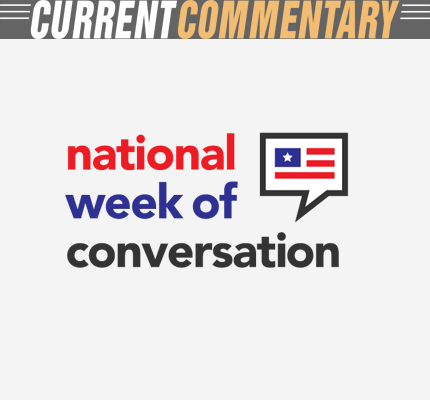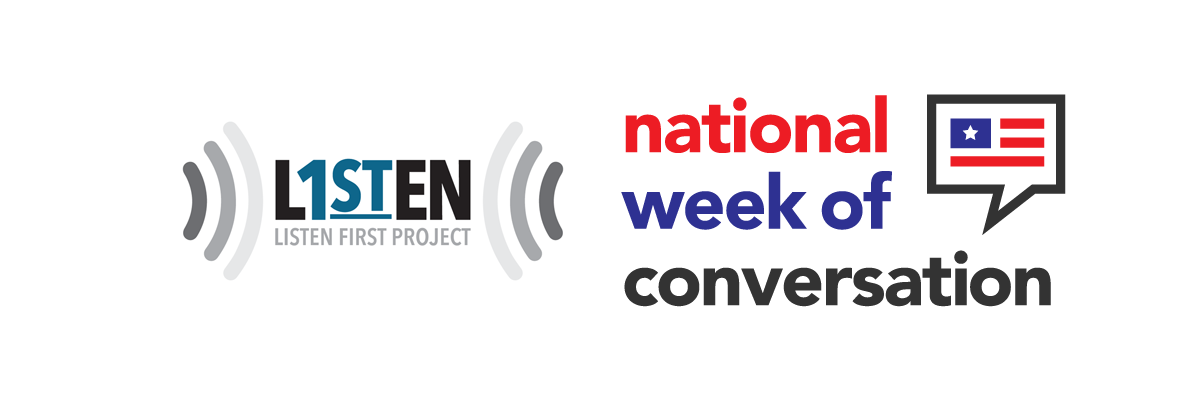
The Role of Listening in Civil Discourse
By Graham Bodie, Ph.D.
I was born and raised in the Deep South, where I have spent most of my adult life. I know bigotry. I see the Confederate flag at least once a day, and I can tell you the location of more than a few so-called monuments, including two that stand prominently in Oxford, Mississippi. Discussions here surrounding these statues are similar in many ways to discussions around the South, discussions that increasingly turn violent.
A Confederate statue was also a catalyst for the Unite the Right rally that was held in Charlottesville last August. The hate and vitriol surrounding that weekend motivated me to start working closely with Listen First Project (LFP), a non-profit whose mission is to “mend the frayed fabric of America” by fostering relationally-oriented conversations. On April 20, we will launch the National Week of Conversation (NWOC) in collaboration with more than 100 organizations from across the country, all united to bring Americans together to engage in conversations about topics that are important to their local communities. The National Week of Conversation kicks off with an LFP event in Charlottesville, Virginia. The horrific events of last summer continue to have a profound, personal impact on the Charlottesville community. They also epitomize the depth of division affecting communities across the country. There is, however, hope for writing new headlines and painting a different picture in Charlottesville and throughout America.
Listen First as a New Paradigm for Dialogue
The mission of LFP and the goals of NWOC align well with the ideals of the National Communication Association (NCA) including the promotion of understanding and respect that can be found in the association’s Credo for Ethical Communication. What the careful reader finds in this, and indeed most, discussions of civil or ethical discourse, however, is a speaking-centered rather than a listen-first approach to dialogue.

As David Beard and I wrote in a chapter chronicling the history of listening research within NCA, although “research in listening is a thread in the tapestry of every dimension of work in the Association,” there remains an imbalance. While several Association members have written that true dialogue starts with a genuine desire to understand and connect with people who hold diverse points of view, direct empirical and theoretical scrutiny of listening pales in comparison with work on speech and speaking. In a similar manner, discussions and commentaries offered after events such as those in Charlottesville focus almost exclusively on issues of free speech and the limits therein. Perhaps endemic of Western culture more generally, much less space is afforded to the role of listening.
In his large-scale study exploring the role of listening in organizations, Jim Macnamara called for a shift from an architecture of speaking, whereby organizations structure their communication activities to transmit information to relevant publics, to an architecture of listening, which involves “creating structures … [and] spaces in which people can interact with organizations in mutually beneficial ways [in] an environment that is welcoming and inclusive.” Creating these structures and spaces requires organizations to first change their culture and then begin to design policies, structures, and procedures that make listening possible. It involves more than simply championing a “speak-up” culture. Indeed, cultures that allow multiple perspectives to be voiced can still fail to actually attend to and understand those voices. In addition, organizations must address the politics of whose voices are valued and attended to; employ technologies to enable engagement; reallocate resources that demonstrate investments of time and budget toward listening; identify and teach the specific skills necessary for competent listening; and determine articulation strategies for informing decision makers of the needs and values of stakeholders.
Although examples of successful large-scale organizational listening exist, a primary finding of Macnamara’s research is that most organizations, especially large government agencies, are not well-equipped to fully listen to their publics. His finding is supported by other studies, such as the National Youth Poll (NYP) conducted by the Institute of Politics at the Harvard Kennedy School. For the past several years, the NYP has found that American youth (18-29) are largely disengaged from politics, in large part because they are disillusioned regarding the direction of the country. Likewise, Weber-Shandwick’s most recent Civility in America poll found that 75 percent of Americans say the lack of civility has reached a crisis level. Increasingly in America, we have moved from simply disagreeing with others to distrusting, disliking, and even despising them because we see the world differently. In many ways, our crisis of civility is a crisis of listening.
Addressing the Crisis of Listening One Conversation at a Time
Apathy and lack of participation, whether in politics or elsewhere, is at least partially the result of people (like our nation’s youth) feeling that they have not been listened to. Why should I spend time engaging with someone (or some organization), if I feel they are not at least attempting to understand me? At some point, if I feel misunderstood or rejected, I am going to go searching for a place where I belong.
Notions of the belonging hypothesis figure prominently in the narrative told by Christian Piccolini, a former leader in the white supremacist movement who now seeks to pull others out of hate groups. As Piccolini tells it, his hate was born out of a need to belong, and he found that belonging in the American neo-Nazi movement. Similar to his entry, his exit from the movement was born out of a realization that his identity, community, and purpose could be better fulfilled by helping, not hating, others.
Particularly relevant for National Week of Conversation is how he pulls others out of the movement by listening for potholes:
"People want to be heard, not talked to, so I listen more than I speak. I listen for potholes -- the trauma, fear, shame, joblessness, mental illness, poverty, privilege -- that detour people's lives. And then I fill them in. It's amazing how building human resilience, self-confidence, connection to others versus a culture of blaming others can obliterate hate without ever saying a word."
And, so as not to be misunderstood, the Week is not all about race or asking people to have conversations with white supremacists. It is not about “very fine people on both sides” of the events in Charlottesville. There were not. Although not all viewpoints are valid, those that share a common respect for human dignity deserve the space to be heard.
The National Week of Conversation strives to provide opportunities for healthy conversational contact, where listening and learning take precedence over arguing and grandstanding. Starting Friday, April 20, and ending Saturday, April 28, 2018, people all over America will participate in conversations that prioritize listening first to understand others across political, socio-economic, and cultural divides. And, while listening will not solve all our problems, changing our mindset to focus more on its potential is a move in the right direction.
Further Reading
- Arneson, P. (2010). Provocation: An ethic of listening in/and social change. International Journal of Listening, 24, 166-169. doi:10.1080/10904018.2010.513648
- Beard, D., & Bodie, G. D. (2014). Listening research in the Communication discipline. In P. J. Gehrke & W. M. Keith (Eds.), The unfinished conversation: 100 years of Communication Studies (pp. 207-233). New York: Routledge.
- Crick, N., & Bodie, G. D. (2016). I says to myself, says I”: Charles Sanders Peirce on the components of dialogue. Communication Theory, 26, 273-289. doi:10.1111/comt.12092
- Floyd, J. J. (2010). Listening: A dialogical perspective. In A. D. Wolvin (Ed.), Listening and human communication in the 21st century (pp. 127-140). Oxford: Wiley-Blackwell.
- Gehrke & W. M. Keith (Eds.), The unfinished conversation: 100 years of Communication Studies. New York: Routledge.
- Harvard University Institute of Politics (IOP). National Youth Poll, Spring 2018. Retrieved from http://iop.harvard.edu/youth-poll
- Heim, J. (2017, August 14). Recounting a day of rage, hate, violence and death: How a rally of white nationalists and supremacists at the University of Virginia turned into a “tragic, tragic weekend.”. Washington Post. Retrieved from https://www.washingtonpost.com/graphics/2017/local/charlottesville-timel...
- Lipari, L. (2009). Listening otherwise: The voice of ethics. International Journal of Listening, 23, 44-59. doi:10.1080/10904010802591888
- Lipari, L. (2010). Listening, thinking, being. Communication Theory, 20, 348-362. doi:10.1111/j.1468-2885.2010.01366.x
- Macnamara, J. (2016). Organizational listening: The missing essential in public communication. New York: Peter Lang.
- Napolitano, A. P. (2017, August 16). Freedom for the speech we hate: The First Amendment was pummeled in Charlottesville. The Washington Times. Retrieved from https://www.washingtontimes.com/news/2017/aug/16/charlottesville-shows-w...
- Picciolini, C. (2017). White American youth: My decent into America’s most violent hate movement - and how I got out. New York: Hachette Books.
- Weber Shandwick, Powell Tate, & KRC Research. (2018). Civility in America 2018: Political edition. Retrieved from http://www.webershandwick.com/news/article/civility.


